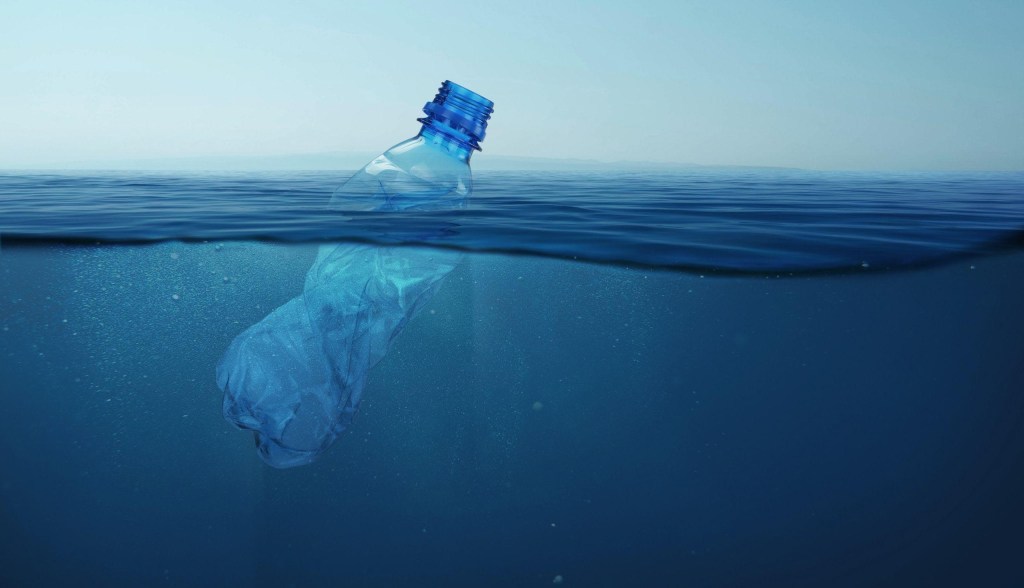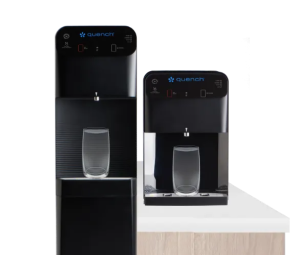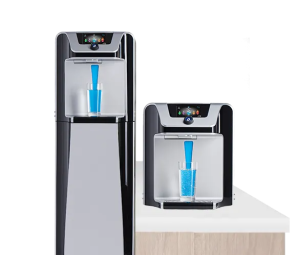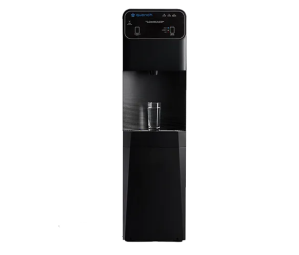
Celebrate World Oceans Day and reduce water bottles
Did you know there’s a giant island located between California and Hawaii? But it’s not the tropical paradise you might be envisioning. It’s a giant patch of garbage and it covers an estimated surface area of 1.6 million square kilometers. That’s twice the size of Texas!
Every day, as humans consume more plastic, the patch gets bigger. At last count, a total of 1.8 trillion pieces of plastic were estimated to be floating in the patch – that’s equal to 250 pieces of trash for every human on earth![1] Worse yet, the Great Pacific Garbage Patch only accounts for a fraction of the total amount of our world’s plastic waste. According to The Ocean Cleanup, there are an estimated 5 trillion pieces of plastic floating around the world’s oceans.
That’s a lot of bad news to take in all at once…but there is a bright side! Each year on June 8, the world comes together to bring awareness and action to the ocean plastic problem. World Oceans Day is a collaborative conservation effort powered by a global network of leaders in 140 countries, providing resources for all to help restore and protect the ocean.
The Culligan Quench Water Experts are tagging onto that effort by offering valuable information and actionable ways to reduce water bottle use in your office. By simply reading this article, you are educating yourself on the world’s plastic waste problem and taking the first steps towards helping rid our oceans of plastic.
How does plastic affect marine life?
Many of us are familiar with heart-wrenching photos of a seahorse wrapped around a cotton swab or a turtle trapped in a fishing net. Plastic is killing marine life around the world. There are countless horror stories of animals’ lives being disrupted or ended by plastic waste. Birds, turtles, fish, and marine mammals can become entangled in or can ingest plastic debris, causing suffocation, starvation, and drowning. According to the United Nations, there are 800 species worldwide affected by marine debris, and at least 80% of that litter is plastic.
Although the large pieces of plastic are what usually make headlines, it’s the bits that often go unseen that are creating more widespread havoc on our marine ecosystems and beyond. Plastic takes hundreds of years to biodegrade, but before that, it breaks down into smaller versions of itself.
Tiny particles of broken-down plastics, known as microplastics, are turning up everywhere, from the bellies of orca whales to sea otter excrement. Plastic bits that are 5 millimeters long (the size of a kernel of corn) or smaller are considered microplastics. Many microplastics are smaller than 5 millimeters, however, and invisible to the naked eye. In some of the most polluted places in the ocean, the mass of plastic is 6 times greater than the amount of plankton.
Fish and other marine wildlife are unintentionally ingesting microplastic toxins at an unprecedented rate. These microplastics are then broken down even further into toxic compounds and bioaccumulated into fish tissue. As this is a relatively new phenomenon, not a whole lot is known about how plastic compounds will affect marine life long-term. In the short-term, however, scientists can see the negative effects of plastics on fish. Some of those negative effects include reduced activity rates, weakened schooling behavior, and compromised liver function. The Washington Post reports that more than 50 species of fish have been found to consume plastic trash, which is bad news for humans who rely on fish for sustenance.
How does plastic affect human life?
Plastic particles that are unintentionally ingested by marine life are often consumed by humans as well. Mackerel, striped bass and Pacific oysters, among other common seafoods, have been found with plastic in their stomachs.
There are several ways plastics can be dangerous for human consumption. The plastics bioaccumulated in fish could further bioaccumulate in people who consume fish that have eaten plastics. Some toxic compounds from plastics can be linked directly to cancer, birth defects, immune system problems, and childhood development issues.
Culligan Quench can help you reduce water bottle use in the office
Single-use plastic bottles are among the top ten types of trash found in the ocean. Ahead of World Oceans Day, we encourage you to take action. You can make a significant positive impact on our marine ecosystems by reducing your water bottle use. Investing in a Culligan Quench bottle-free water cooler can help you reach your conservation goals. The average office that switches to a Culligan Quench bottle-free office water cooler prevents 150 5-gallon plastic water jugs from entering landfills and waterways every year. By equipping your office with a Culligan Quench cooler, you can incentivize an entire office of people to reduce their water bottle use.
With the uptick of plastic production due to the COVID-19 crisis, now is an optimal time to make the switch to a bottle-free cooler. Experts predict the implications of the rapid increase of plastic production could mean years of trouble for our already polluted oceans. By ridding your office’s need to purchase single-use plastic bottles, you are getting ahead of the long-term environmental harm of the health crisis.
Enhancing the sustainability efforts of our customers is a core value of Culligan Quench’s service. We help our customers eliminate the use of bottled drinking water delivery services and the incumbent fossil fuel depletion, carbon emissions, and the addition of plastics to the waste stream.
Culligan Quench strives to incorporate sustainable environmental practices in our operations
wherever possible, and continually seeks to improve our product offerings and business practices to reduce our own environmental footprint.
Want to learn more about Culligan Quench and our bottle-free filtered water dispensers? Can’t wait to get started? Click on the “Get a Free Estimate” button and we will have one of our Quench Water Experts contact you.
Recommended products
Culligan Quench has an advanced suite of point-of-use systems that are designed to meet the needs of workplaces of all shapes and sizes. Here are some products we recommend for your business.
Q8 Touchless Bottleless Water Cooler
Available with quenchWATER+ electrolyte water

Q10 Bottleless Water Cooler With Sparkling Water
Includes Firewall® UV Protection

Q12 Touchless Bottleless Water Cooler
Available with quenchWATER+ electrolyte water